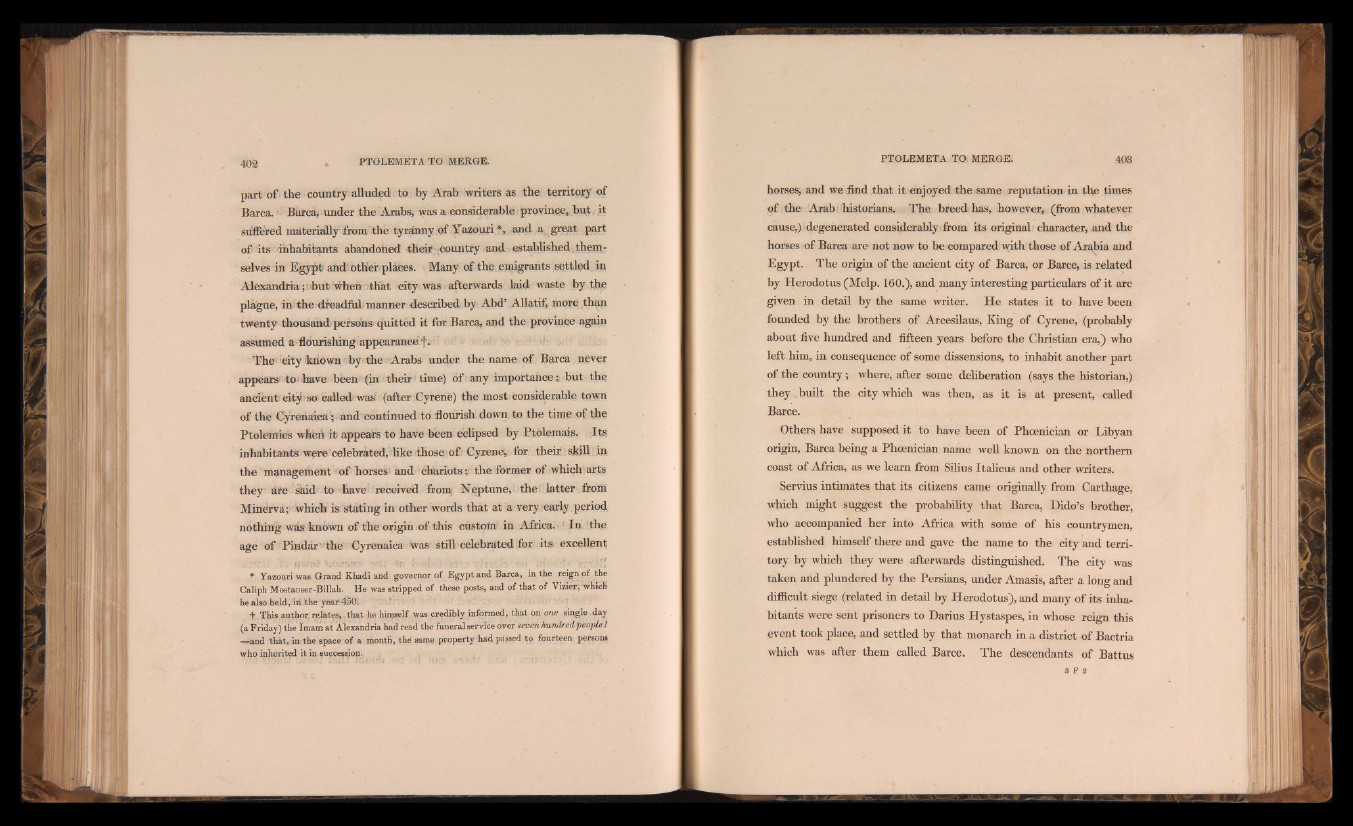
part of the country alluded to by Arab writers as the territory of
Barca. Barca, under the Arabs, was a considerable province, but it
suffered materially from the tyranny of Yazouri % and a great part
of its inhabitants abandoned their country ■ and established,themselves
in Egypt andbther places. Many of the. emigrants settled in
Alexandria;. bu t ithen that city; was i afterwards laid waste by the
plague, in the dreadful manner described by Abd’ Allatif, more than
twenty thousand-persons quitted it for Barca, and the province again
assumed a flourishing appearance +.1
Thu ¡eity ¡known by the ' Arabs under the name of Barca, never
appears tofrave been fin their time) of any importance;; but the
ancient eity so called was (after Cyrenfe) the most considerable tpwn
of the Cyrenaieaand continued to flourish down to the time of the
Ptolemies wfreii it appears to have been eclipsed by Ptolemais, t i t s
inhabitants were!celebrated, like those of Gyrene, for their; skill; in
the management of horses and chariots? the former of whichlarts
they are skid to have received from .Neptune, the latter from
MinCrva;'which is; stating in other words that at a very early period
nothing was known of the origin of this custom in Africa. In the
age of Pindar the Cyrenaiea was still celebrated for its. excellent
* Yazouri was Grand Khadi and governor of Egypt and Barca, in the reign pf the
Caliph Mostanser-Billah. He was stripped of these posts, and of that of Vizier;'which
he also held, in the year 450.
+. This author, relates, that he himself was credibly informed, that on one single day
(a Friday) the Imam a t Alexandria had read the funeral service over seven hundred people !
—and that, in the space of a month, the same property had passed to fourteen persons
who inherited it in succession.
horses, and we find that it enjoyed the same reputation in the times
of the Arab; historians. The breed has, however, (from whatever
cause,) degenerated considerably from its original character, and the
horses of Barca are not now to be compared with those of Arabia and
Egypt. The origin of the ancient city of Barca, or Barce, is related
by Herodotus (Melp. 160.), and many interesting particulars of it are
given in detail by the same writer. He states it to have been
founded by the brothers of Arcesilaus, King of Cyrene, (probably
about five hundred and fifteen years before the Christian era,) who
left him, in consequence of some dissensions, to inhabit another part
of the country ; where, after some deliberation (says the historian,)
they . built the city which was then, , as it is at present, called
Barce.
Others, have supposed it to have been of Phoenician or Libyan
origin, Barca being a Phoenician name well known on the northern
coast of Africa, as we learn from Silius Italicus and other writers.
Servius intimates that its citizens came originally from Carthage,
which might suggest the probability that Barca, Dido’s brother,
who accompanied her into Africa with some of his countrymen,
established himself there and gave the name to the city and territory
by which they were afterwards distinguished. The city was
taken and plundered by the Persians, under Amasis, after a long and
difficult siege (related in detail by Herodotus), and many of its inhabitants
were sent prisoners to Darius Hystaspes, in whose reign this
event took place, and settled by that monarch in a district of Bactria
which was after them called Barce. The descendants of Battus